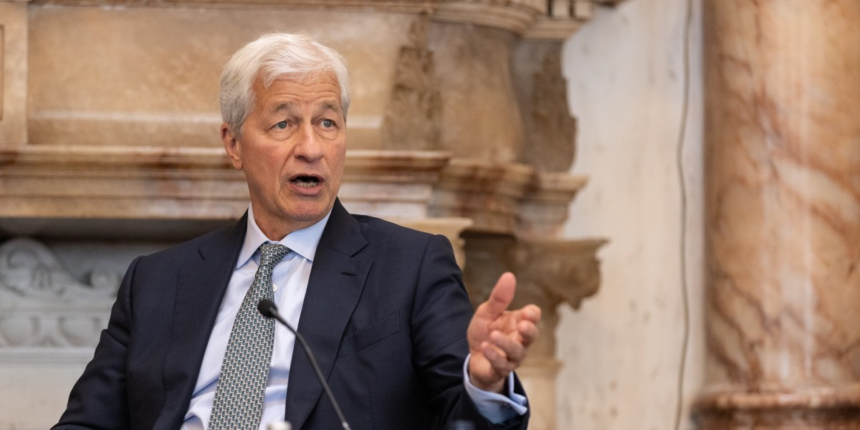Under the plan, every time a consumer moves money from JPMorgan Chase to a crypto account or a third-party service like Venmo, the bank could charge the data aggregators a fee. This would make it economically impossible for many consumers to use stablecoins and crypto, according to three industry executives, who declined to speak on the record for fear of retaliation. “This would cripple the crypto industry,” one of the execs said.
The fees are also expected to be onerous for many early-stage fintechs, executives told Fortune. One fintech estimated that the fees to access JPMorgan’s API would be more than the revenue the company made in its 10-year existence. “This would put everyone out of business…It would require everyone to raise prices by 1000% to cover [the cost],” the first exec said.
Crypto firms and fintechs typically use aggregators, like Plaid or MX, to access customer accounts at major financial institutions like JPMorgan Chase. Up to now, the banks have not charged the fintechs, but this may change.
“The JPMorgan fees make it impossible to serve Chase customers if you are a small company,” a second executive said.
“This is not a technical innovation. It is a toll,” Sethi said. “And once data becomes a revenue stream for the infrastructure provider, the incentive is to fragment it, lock it in, and sell it at margin.”
“We’ve invested significant resources creating a valuable and secure system that protects customer data. We’ve had productive conversations and are working with the entire ecosystem to ensure we’re all making the necessary investments in the infrastructure that keeps our customers safe,” JPMorgan Chase said in a statement Wednesday.
When it comes to more mature fintechs like PayPal and Block, which owns Cash App, analysts believe they will face little impact from the fees since they already negotiated agreements on fees with the largest banks, including JPMorgan “on a multi-faceted basis,” including cards, other relationships, and processing, said Bernstein’s Rawat. “PayPal and Block also likely have limited (or manageable) exposure to data aggregators,” Rawat said. (Aggregators typically provide technology, such as APIs, that let consumers connect their financial accounts to an app or service.)
Some think this positive view is premature. Much depends on the size of the fees, the second executive said. “The impact could be pretty immense,” they said.
“I expect to win, so help me God,” Dimon said during the call. At the time, Dimon singled out Plaid—a widely used service that helps consumers quickly connect apps like Venmo to their bank account—saying there are “people who improperly use data that’s been given to them, like Plaid.”
Skeptics, however, doubt that protecting consumers is JPMorgan’s prime concern when it comes to fintechs. Instead, they view charging fees for data as a way for large banks to build a moat around their products and services, making it hard for consumers to access competing services, according to the executives. “Banks have invested a lot of money to build their offerings. But fintechs have invested a lot of money to build their technology,” a third exec said.
The fees will raise costs for consumers, limit their financial choices while jeopardizing innovation, a second executive said. “This will kill innovation and consumer choice,” a fourth person said.
In its contracts with aggregators, JPMorgan has always reserved the right to charge for the data, a second person familiar with the situation said. The bank also wants to encourage more responsible data access practices. Each month, JPMorgan typically receives 2 billion data calls—requests for access to customer data—from aggregators. But in 90% of these data pulls, the customer isn’t actively seeking the data, the second person said.
About three weeks ago, in late June, JPMorgan informed all its aggregator customers who use its API that they would need to start paying. The first fees would start triggering at the end of August, the person said. Aggregators are expected to pass on the costs—whatever they are—to consumers.
“I think [JPMorgan is] exactly right. I think there’s a big cost to keeping this data secure and producing it in a form that’s readable for our clients. So we’re, you know, we’re thinking about it,” said Demchak, who said PNC was “in discussions.”
JPMorgan Chase is exploiting regulatory uncertainty to levy a “punitive tax on competitive offerings,” said Steve Boms, executive director of the Financial Data and Technology Association, or FDATA, a trade association that represents financial services companies. “This is a blatant effort to curtail innovation and undermine a stronger American financial system,” Boms said in a statement.
This story has been clarified to say that JPMorgan has already informed the data aggregators that it would start charging fees for accessing its customers’ bank account information.









